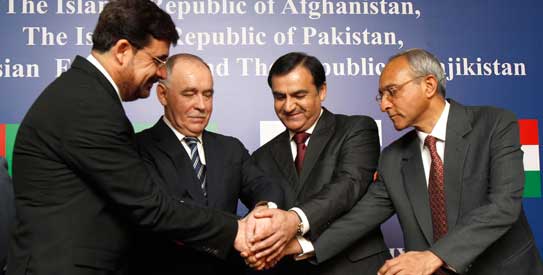MOSCOW: Afghanistan, Pakistan and Tajikistan agreed with Russia on Wednesday to step up efforts in fighting the Afghan heroin trade which kills at least 30,000 Russians a year.
“We are neighbours linked by the same piece of land, and we have the potential to strengthen our work in fighting a global menace,” Russia's anti-drugs tsar Viktor Ivanov told his Central Asian counterparts.
The quartet of heroin-inflicted countries signed an agreement to destroy opium crops and drug-making labs, as well as exchange information on drug trafficking and dealers.
Russia is struggling to contain a potentially crippling heroin crisis. The world's largest per capita heroin consumer, with at least 2 million addicts, Russia is now facing an HIV/AIDS epidemic that is spreading amongst drug users from dirty needles, Western health officials say.
Heroin from Afghanistan -- which produces around 90 percent of the world's total -- is smuggled through its porous border with impoverished, ex-Soviet Tajikistan, then via Kyrgyzstan and Kazakhstan and onto the Russian market, Ivanov said.
Through Pakistan, heroin passes through India and on to China and other Asian countries, he added.
Ivanov said that up to a quarter of Afghan heroin ended up in Russia. Russian President Dmitry Medvedev has called the Afghan drug trade, estimated to be worth around $65 billion annually, a threat to national security.
Afghan President Hamid Karzai has sought to improve ties with Russia, and in August asked for Medvedev's help in security and battling the drug trade in his nation, site of a decade-long war that cost the lives of 15,000 Soviet troops.
“We alone cannot overcome the evil of drug production,” said Afghanistan's Counter Narcotics Minister Zarar Ahmad Muqbel.
In June, Russia rolled out a global initiative to combat Afghan drug trafficking that included a crackdown on opium poppy growing, but it was met with a tepid response from the United States and Nato.
Moscow says it believes US-led Nato forces fighting the Taliban in Afghanistan are reluctant to uproot local drug output, which surged after the 2001 invasion.
“Nato has not found a way to get to the root of the problem, which is Afghanistan's drug production,” Ivanov said.
The United States has said repeatedly that eradicating poppy plantations would push disgruntled Afghan farmers into the hands of the insurgents.
Ivanov praised an unprecedented joint Russian-US anti-narcotics operation in Afghanistan in October, in which four drug labs and nearly a tonne of heroin were destroyed in a raid, widely seen as a measure to improve ties between the Cold War foes.
“We really want to see more such operations. And hopefully very soon,” Ivanov told Reuters, declining to give a time frame. – Reuters













































Dear visitor, the comments section is undergoing an overhaul and will return soon.